Can I improve my “inborn skills” significantly via effort?
Reading Time: 6 minutes
Self Help, Personality
Learn from Dr. Carol S. Dweck’s “Mindset”
This is the first of a series of our insights into the lessons learnt from Dr. Carol S. Dweck’s book “Mindset”.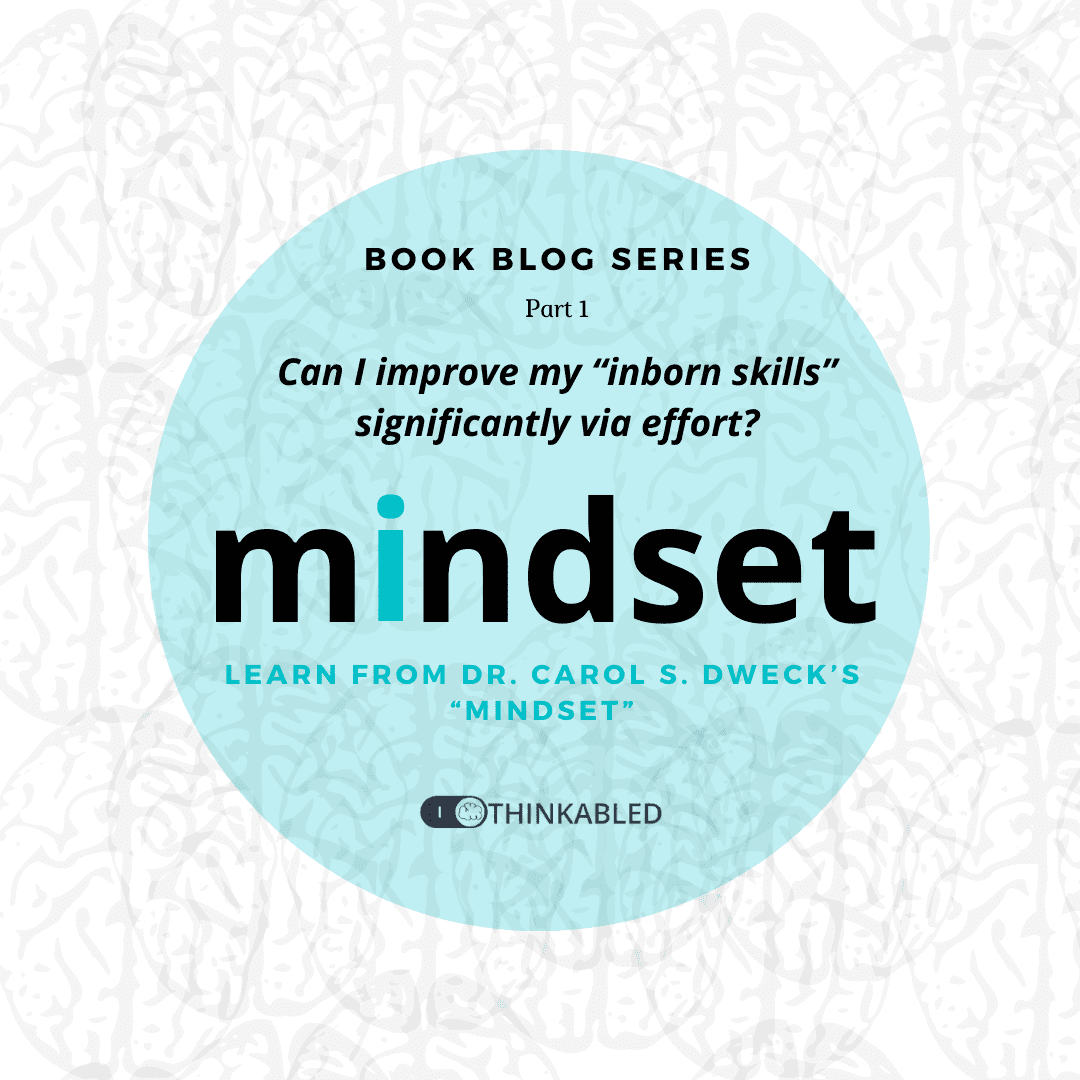
Introduction to “mindsets”
Why do different people cope with similar situations in remarkably different ways? Are these different mechanisms of dealing with life purely “genetic”? Or are they a summative collection of experiences, environment and expertise?
These are some of the thought-provoking questions that sparkled the curiosity out of Dr. Carol S. Dweck. After more than 20 years of research in the fields of personality, social psychology, and developmental psychology, we are glad to learn some of the profound lessons she learnt for these questions through her million-copy bestseller “Mindset”.
Who should read this blog post?
- This blogpost is suitable for all people especially students, parents, businessmen,coaches and thinkers
The role of “Mindset” in our everyday response-to-stimulus
In the pursuit of seeking answers to the questions raised in the beginning, we come to the realization that there is an entity deeper than our genetics, experience, environment and expertise. This entity is so powerful that it accounts for the differences that we see in the behavioural patterns of human beings. This entity is so central in explaining why different human beings even within the same family sharing common genes and living within similar conditions respond in strikingly different (sometimes even in contradictory) ways to the same stimulus.What is this powerful entity and why is it so vital to know about it to determine how our personalities are shaped? They are our “mindsets”. Our mindsets shape our response to success and failure. They determine how and why we grow or crumble when faced with challenges. They explain the growth-curves of successful people in all fields. In fact, mindsets play a much more important role than we think they do. The wingspan of their influence is not limited to people’s careers. Rather, they maintain a key role in our everyday response to vegetative stimulus, interpersonal relationships, parenting, bullying and more.
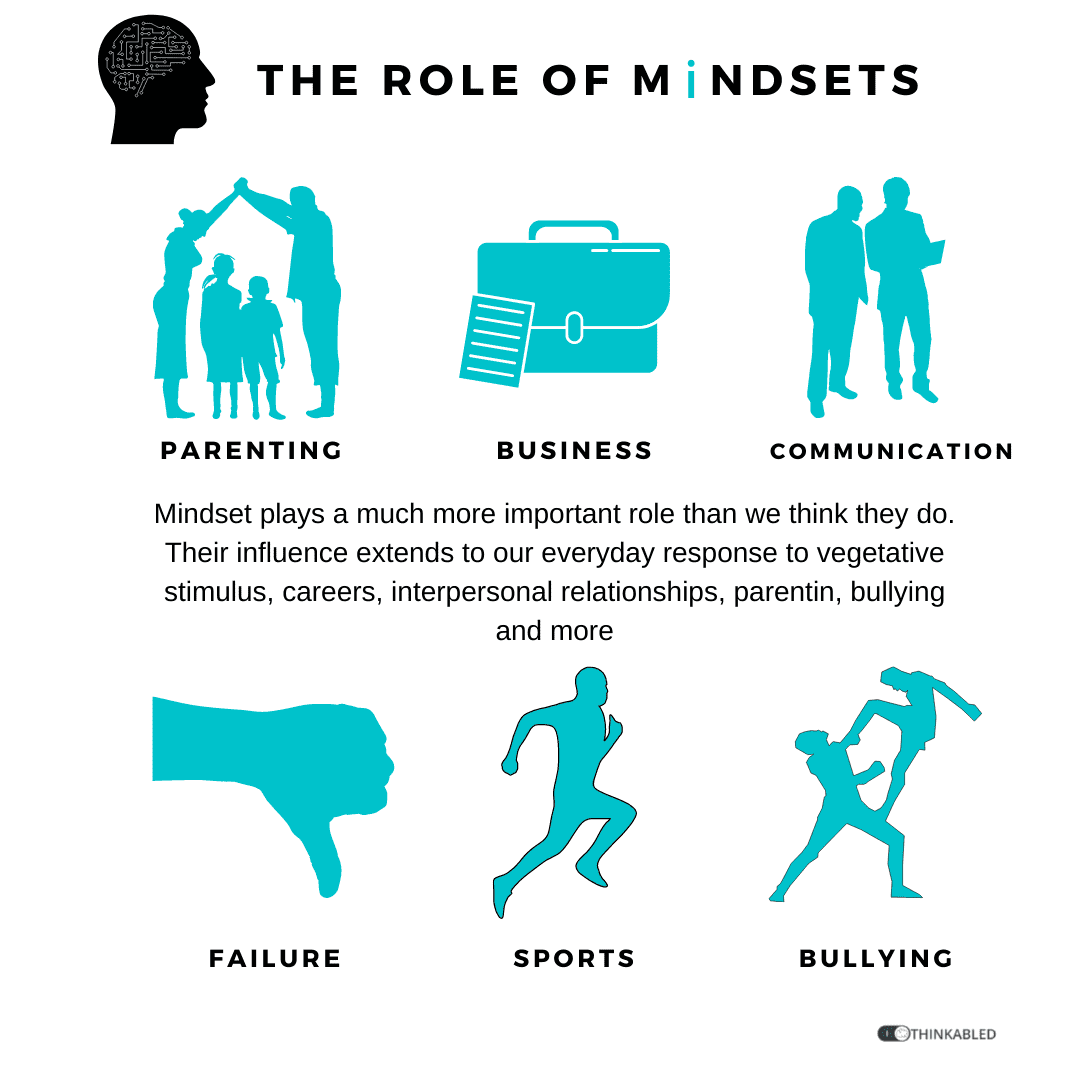
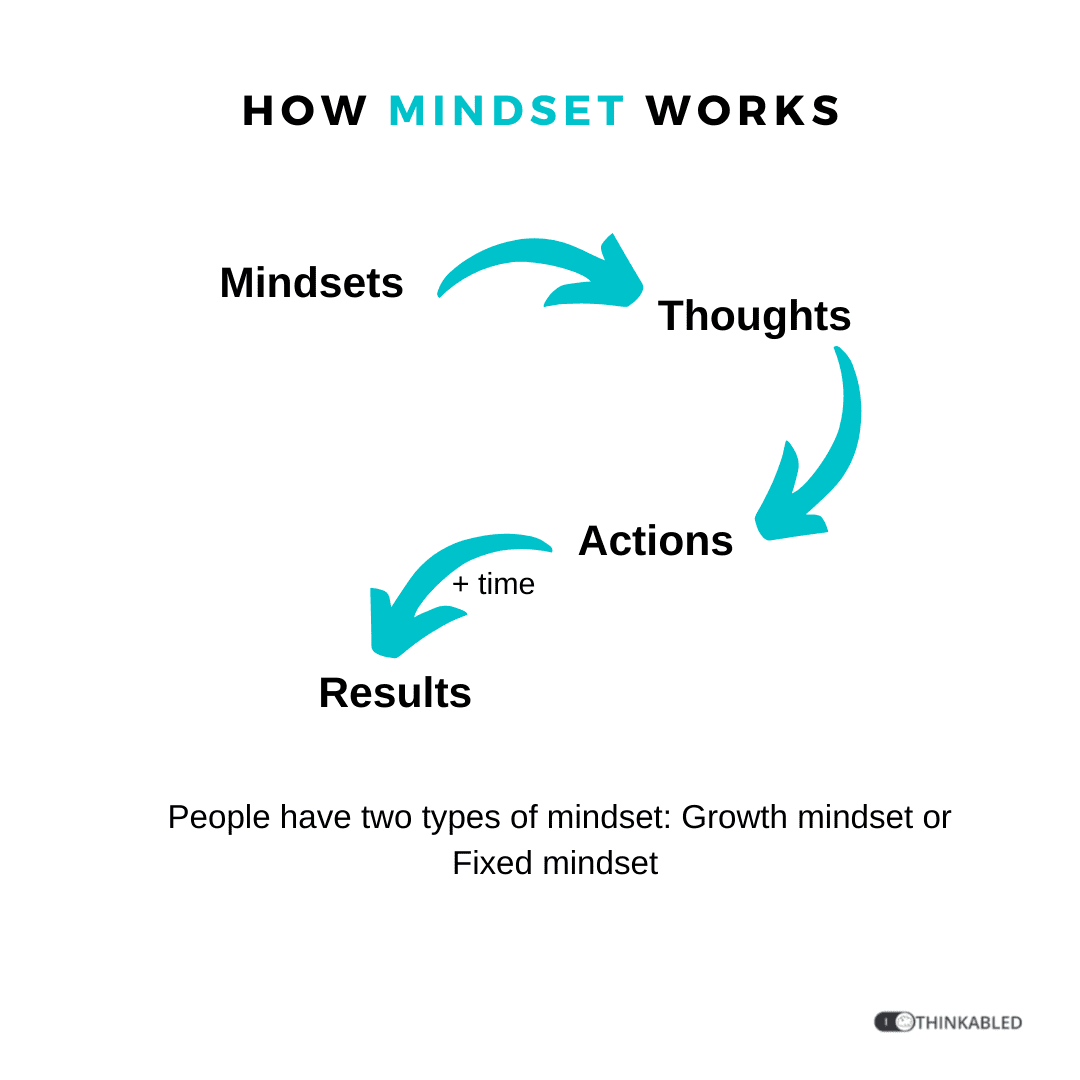
Understanding Mindsets
To understand mindset, click on the statement which you think is correct regarding your personality 1- My personality is from my genes and there is little I can do about it 2- My personality can be changed but within certain limits 3- My personality can be changed significantly depending on my will and effort Dr. Carol Dweck categorises people into two mindsets: the ones with a “fixed” mindset and others with a “growth” mindset. How significant are the differences between these two classes of people?Growth Mindset: Rome wasn’t built in a day
People with growth mindset have a common belief: they believe in the power of change. They believe that challenges are opportunities to improvise oneself and not obstacles that deprive oneself of worth and satisfaction. They view honest criticisms as a reminder to introspect, adapt and get better rather than to view them as a threat to their glory. They simply r believe that human qualities could be cultivated through effort.Growth mindset replaces the concept of “smart” with its comparative : smarter. The goal is not to be a “smart” person, but rather to be ”smarter” than what you are. However, there are a few important questions that are raised about such people?
- Do these people believe anyone can be anything provided they are given right guidance and motivation?
- Do these people reach the pinnacle of success in their field of expertise?
- Do all successful people such as CEO, renowned athletes, and other personalities have a growth mindset?
Fixed mindset: If Rome wasn’t built in a day, then it wasn’t meant to be.
Just like people with growth mindset, those with fixed mindset share a common school of thought: not all qualities are susceptible to change. Most qualities are either fixed like the colour of one’s pupil or subject to change within a distinct boundary. They believe that it is not possible to challenge the top performer no matter what because they possess the necessary “genes”. You have to be “smart” enough to compete with the smart ones. Challenges act as obstacles in the pathway of success and satisfaction and the best way of life is the one without them.
Does this necessarily mean that people with fixed mindset never succeed in life? We will answer this question deeply on our upcoming posts. However, it is worthwhile to know that people with growth mindset and fixed mindset view success differently just like how their concept of smartness is different. In fact, it requires risks and failures to truly expose those with a fixed mindset and those with growth mindset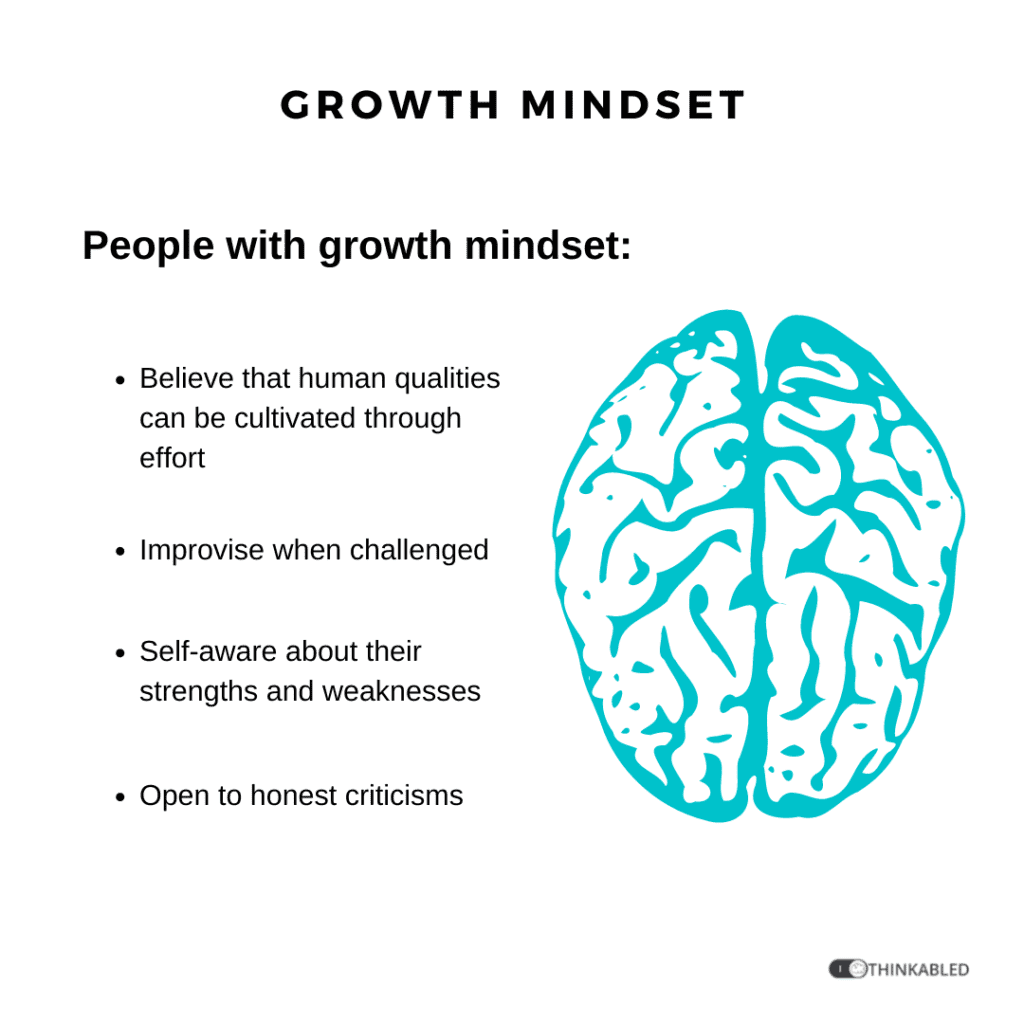
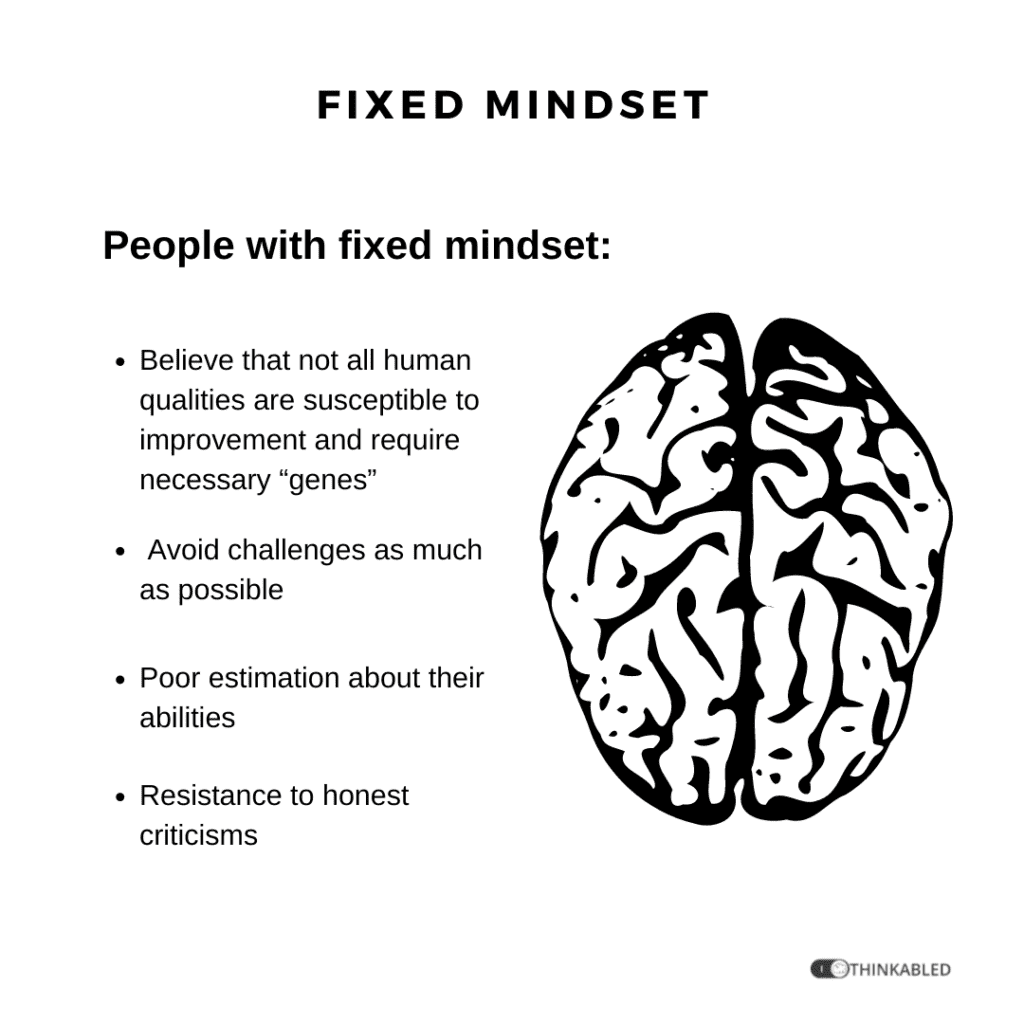
Growth vs Fixed Mindset
Let’s comeback to our question. Do people with growth mindset believe anyone can be anything provided they are given right guidance and motivation? The answer is No. Yet what makes people with growth mindset stand out from their counterparts is the ability to recognize their potential and levels. Without understanding where you are now, it is difficult to take practical steps to improvise. Rather than being in a state of utopia, growth mindset creates a sense of true self-awareness.
On the other hand, fixed mindset base your abilities on fixed targets. If you achieve the target, you have succeeded and if you don’t, you are a failure. These is little self-awareness and by extension, little room for improvement. How can you improve your intelligence if you’re born with a low IQ? Your stage-fear is real and you can never come out well as a public speaker no matter how much you try. The captain of your football team hails from a lineage of footballers, hasn’t he gotten an unfair advantage over me? With this line of thinking, not only does growth becomes stunted, the entire motivation to take effect and keep moving dies. The most profound impact of mindset becomes visible in the long run. Anything lasting long enough is bound to have faced challenges that had to be fought against. And this is exactly where growth occurs as well. When faced with a challenge, people with growth mindset are alerted to make necessary changes in their game. The knowledge that they need to change will lead to actions that initiate a change and the series of these actions and associated challenges eventually lead to improvement or growth.Conclusion

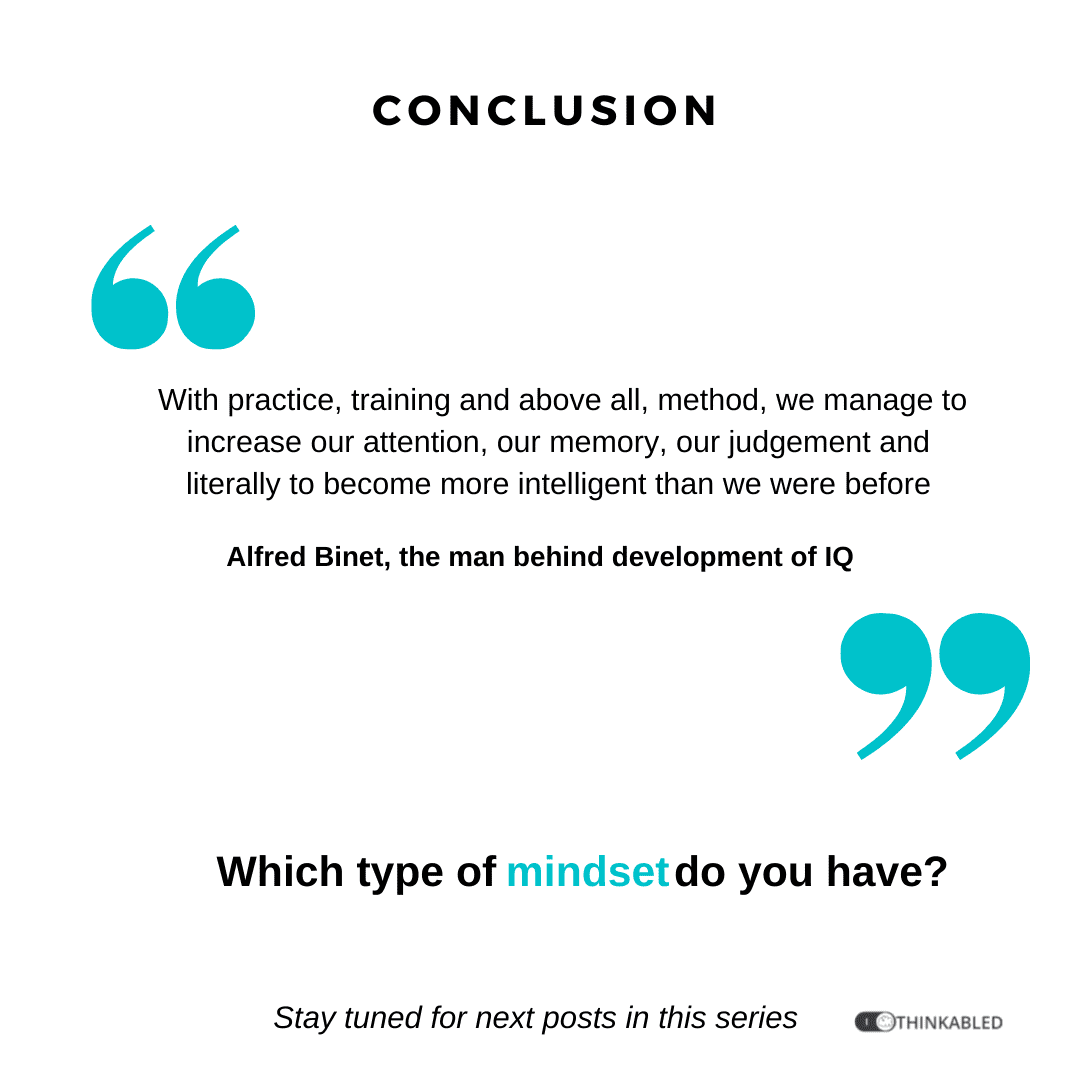 Alfred Binet, the man behind IQ tests, states in his book, “Modern Ideas About Children”
Alfred Binet, the man behind IQ tests, states in his book, “Modern Ideas About Children”
With practice, training and above all, method, we manage to increase our attention, our memory, our judgement and literally to become more intelligent than we were beforeHoward Gardener in his book, “Extraordinary Minds”:
Exceptional individuals have a special talent for identifying their own strengths and their weaknesses.This is the first of a series of our insights into the lessons learnt from Dr. Carol S. Dweck’s book “Mindset”. Read our next article here. To check our other blogs, click here. Download our catchy infographics for this series by clicking the link below and share it with your peers! Download Infographics for Mindset Series: Introduction
